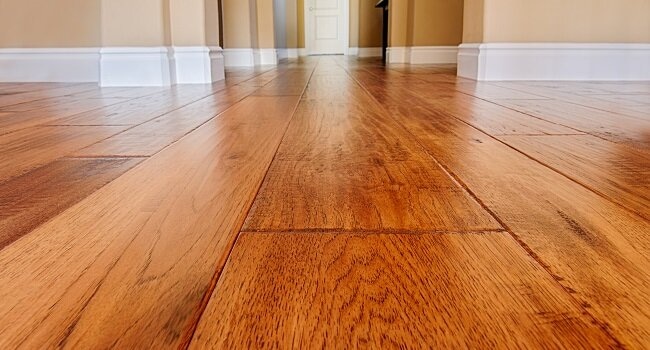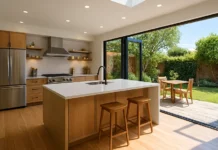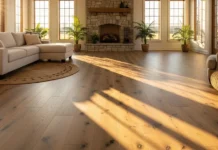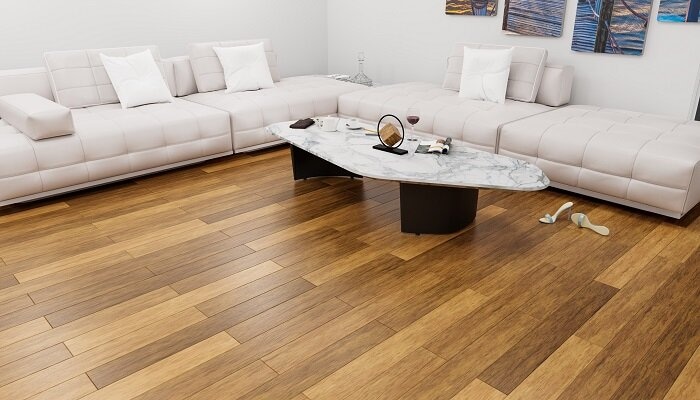Hardwood flooring is popular among homeowners and interior designers for its unparalleled beauty, durability, and versatility. This flooring type is made from solid, natural wood, which gives it a unique character that sets it apart from other flooring options.
While many flooring options are available, hardwood is still the most sought-after material. Here are ten key factors that make hardwood flooring stand out from other types of flooring.
1. Aesthetic Appeal and Timelessness
One of the main reasons people choose hardwood flooring is its aesthetic appeal. Hardwood floors have a timeless beauty that complements various design styles and enhances the overall look of a space. They can also be customized with different stains and finishes, allowing homeowners to achieve the desired look for their homes. For more information on different hardwood styles and finishes, click here.
Moreover, hardwood floors age gracefully and develop a rich patina over time, which adds to their charm. This timelessness ensures that hardwood floors will continue to look attractive even as trends change, making them a wise investment for homeowners.
2. Durability and Longevity
When it comes to durability and longevity, hardwood flooring is unmatched. These floors are designed to withstand daily wear and tear, making them ideal for high-traffic areas.
Furthermore, hardwood floors can be sanded and refinished multiple times, which extends their lifespan significantly. It can last for decades, providing great value for the investment.
3. Environmentally Friendly
Hardwood flooring is an environmentally friendly option since wood is a renewable resource. Many hardwood flooring manufacturers practice sustainable harvesting methods, ensuring forests’ continued growth and preservation.
Moreover, hardwood flooring has a long lifespan, which reduces the need for frequent replacement and minimizes waste. This feature makes hardwood flooring more eco-friendly than other materials with shorter lifespans.
4. Easy Maintenance and Cleaning
Hardwood floors are easy to clean by sweeping or vacuuming to remove dust and debris. Occasional damp mopping with a wood floor cleaner is sufficient to maintain their cleanliness.
Additionally, hardwood flooring does not harbor allergens, making it a healthier choice for allergy sufferers. Hardwood floors contribute to a cleaner indoor environment, unlike carpets, which can trap dust, pollen, and pet dander.
5. Natural Insulation and Comfort
Another benefit of hardwood flooring is its natural insulation properties. Wood is an excellent insulator, helping maintain a comfortable room temperature. In this case, hardwood floors can contribute to your home’s energy efficiency.
Not only do hardwood floors provide insulation, but they also offer a comfortable surface to walk on. Their warmth underfoot makes them a pleasant choice for living areas and bedrooms.
6. Versatility in Design
Hardwood flooring is versatile and can be adapted to suit various interior design styles. From traditional to modern, rustic to minimalist, hardwood floors provide a solid foundation that complements any décor.
Furthermore, there is a wide range of wood species, grains, and colors to choose from, allowing homeowners to customize their flooring to suit their tastes and preferences. This versatility in design makes hardwood flooring a popular choice for many.
7. Increased Home Value
Investing in hardwood flooring is a wise decision for its value to a home. Many homebuyers appreciate the look and feel of hardwood floors, making them willing to pay a premium for homes with this type of flooring.

As a result, hardwood flooring can significantly increase the resale value of a property, making it a wise long-term investment.
8. Sound Absorption
Another advantage of hardwood flooring is its sound absorption capabilities. Wood absorbs sound, resulting in a quieter and more peaceful living environment. This sound absorption is especially beneficial in multi-story homes and apartment buildings, where noise can easily travel between floors.
Additionally, you can place area rugs to enhance sound absorption further and add a layer of comfort and style to hardwood floors. This combination of noise absorption and aesthetic appeal makes hardwood flooring an attractive option for many homeowners.
9. Opportunity For Refinishing
One of the unique features of hardwood flooring is its ability to be refinished. Over time, hardwood floors may develop scratches, dents, or other signs of wear. However, sanding and refinishing the surface can quickly repair these imperfections.
This process not only restores the floor’s original beauty but also allows homeowners to update the look of their flooring by changing the stain or finish. This ability to be refinished ensures that hardwood floors can adapt to evolving design trends and remain attractive for many years.
10. Promotes Healthy Indoor Air Quality
Hardwood flooring is a wise choice for those concerned about maintaining a healthy indoor environment. As mentioned earlier, hardwood floors do not harbor allergens like dust, pollen, and pet dander, which can accumulate in carpets and other types of flooring.
Moreover, hardwood flooring does not emit harmful volatile organic compounds (VOCs), as some synthetic flooring materials do. It contributes to better indoor air quality, promoting a healthier living environment for occupants.
Conclusion
Hardwood flooring stands out from other flooring types for its aesthetic appeal, durability, versatility, and numerous other benefits. Homeowners who invest in hardwood floors can enjoy a timeless, beautiful, and practical flooring solution that adds value to their property and enhances their living experience.
































